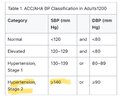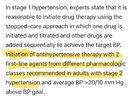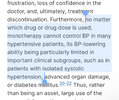Ghoul
Member
So if you say 140/80…. Could be changed with lifestyle choices perhaps?
Possibly, and that's where they always recommend things start, unless diastolic is over 100, since that pretty much guarantees organ damage at a rapid rate.
However, unless you're a grossly obese, sedentary smoker, I don't think there's enough in the way of changes that would get 140/80 to 120/70 fast enough to warrant the accumulating damage going on with that BP.
I'm not cutting back on salt and meditating for an hour every day in the hopes it'll come down to a healthy level in a year or two.
With your blood vessels stretched by that BP, the endothelial layer has all sorts of "cracks" opened up that cholesterol can get shoved under adding to the deadly plaque that squeezes your pipes shut and finishes most of us off. Realizing that's going on continuously lit a fire under my ass to slow or stop that process asap.
Then there are "micro strokes", seemingly symptomless, that cumulatively add to our brain's degradation that's attributed to "normal aging". The same goes for the micro vessels rupturing in our eyes over the time we have high BP.
My outlook on BP changed completely after hearing a panel of leading "Preventive Cardiologists" (have you had the privledge of being treated by one of these? Me neither. Commoners get the cardiologists that primarily treat the damage after the fact).
Anyway, they were doing their annual review of the latest data and developments, and at one point they dropped all the highly technical talk and discussed how frustrating it is that people don't realize how much benefit there is in simply taking a single pill to get your BP into an ideal range. The vast majority of the population has uncontrolled hypertension. Even primary care docs don't take it as seriously as they should despite knowing better. Basically, they were talking about the great new BP meds coming but said, essentially, "we have everything we need, right now, for 98% of the population to maintain ideal BP with no to minimal sides"
When I saw the updated flowchart I linked above today, I laughed, because since last time they added a major emphasis on a "one pill" solution.
At the panel, they pointed to a recent study that determined people were 70% more likely to stick to BP meds if it was a single pill. (and how generics should be forced to "look" the same for the same meds, as a color change on refill leads to 30% of patients stopping the drug within a month, if the shape changes 40% dropping out, if both change something like 65-70% of people stop taking their lifesaving BP med.).
Last edited:




